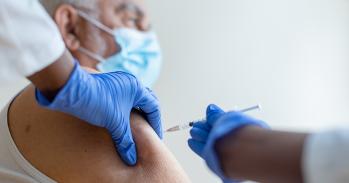
Policymakers around the world are relying on the expertise of scientists to help make decisions around the COVID-19 pandemic. But how do scientists learn to advise policymakers? Noam Obermeister from Cambridge’s Department of Geography argues that this has been overlooked in the past, and suggests how studying their learning might help us prepare for future emergencies.
Policymakers around the world are relying on the expertise of scientists to help make decisions around the COVID-19 pandemic. But how do scientists learn to advise policymakers? Noam Obermeister from Cambridge’s Department of Geography argues that this has been overlooked in the past, and suggests how studying their learning might help us prepare for future emergencies.
Despite years of experience advising the government, Professor Neil Ferguson couldn’t have anticipated that his private life would become a matter of public scrutiny last month, essentially ending his formal relationship with government. No less surprising is the move from a former Government Chief Scientific Adviser, Professor Sir David King, to set up a so-called ‘Independent SAGE’ - laying bare the kinds of deliberations that would have taken place behind closed doors during his appointment.
The bottom line for high-profile scientists and scientific advisers is that the rules of the game have changed. They may have learned that discretion is highly valued by policymakers, and yet, calls for transparency continue to resound louder than ever. How are scientists dealing with these new circumstances? What are they learning?
In a recent paper, I argue that too little attention has been given to how experts learn to advise policymakers. Although there is no shortage of guidelines and fragments of wisdom for researchers who want to see their work (or the work of colleagues) inform policymaking, scientific advice to governments is largely a case of learning on the job.
In their role as scientific advisers, experts learn what is and isn’t appropriate behaviour, what is and isn’t politically acceptable, and to draw the line where the science ‘ends’ and the politics ‘begin’. Scientific advice is a tricky balancing act between making expert judgments on the best available evidence and calibrating those judgments to the politics of the issues at hand. Like a tightrope walker, the scientific adviser has to learn to get the balance just right.
The journey from full-time academic to part-time scientific adviser can be a transformative one. Researchers might initially set out with expectations of how scientists and policymakers interact and have had to revisit those expectations in view of their various encounters and experiences. While their learning may not always be transformative, I suggest that it is always necessarily situated: different organisations and environments will influence and shape their learning in different ways. This includes discussions with peers on scientific advisory committees, for example. How and what advisers learn, then, is never quite divorced from where they learn.
So why should we care? Taking the long view, I see three reasons why we might want to put advisers’ learning under the microscope:
- Compiling the know-how of experienced advisers can be helpful for less experienced or early-career researchers who wish to engage with policymakers. Because there is no universal roadmap for success, I think we should focus on coming up with some ‘warning signs’ - as opposed to ‘direction signs’ - by identifying and communicating common pitfalls, for instance.
- Given the situated nature of their own learning, advisers can directly contribute to the institutional learning and memory of the science-policy organisations they are part of. Involving committee members in decision-making can help prevent needless reinvention of the wheel and improve organisational reforms, leading to more sustainable change.
- As both academics and policy advisers, scientific advisers are particularly well-placed to understand how academic research informs (or fails to inform) policymaking, as well as how the scientific community works and is governed. Therefore, they are knowledgeable not only about science for policy, but also about policy for science. For those reasons, I think that research funding organisations – such as UKRI research councils - should more systematically consult experienced science advisers in the formulation of their policies, especially in relation to research impact. For instance, improved impact evaluation frameworks would have positive trickle-down effects on the wider academic community, especially for early-career researchers who tend to base their understanding of impact in large part on the existing guidelines for grant applications or job descriptions.
The core message is that as the nature of both science and policymaking continues to change, the learning experiences of expert advisers is an abundant resource that has yet to be tapped into. This has become all the more evident with COVID-19, as scientific advisers’ learning curves are likely to be steep. In the aftermath of the pandemic, we’ll need an evaluation of ‘what happened’ and ‘what went wrong’.
For the whole picture, we can’t just rely on the loudest or the most visible voices. We’ll need to turn to those scientific advisers whose stories go largely untold. Importantly, we’ll need to understand why the acquired skillset of scientific advisers may not be suited for crisis situations. Only then can we ensure that lessons are learned and that our networks of science advice are prepared for future emergencies.

The text in this work is licensed under a Creative Commons Attribution 4.0 International License. Images, including our videos, are Copyright ©University of Cambridge and licensors/contributors as identified. All rights reserved. We make our image and video content available in a number of ways – as here, on our main website under its Terms and conditions, and on a range of channels including social media that permit your use and sharing of our content under their respective Terms.




